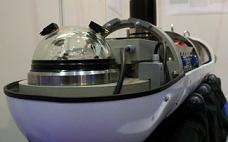Nov 29 2010
Scientists from the Fraunhofer Institute for Optronics, Germany, under the leadership of Dr. Thomas Rauschenbach, are researching on a cost-effective autonomous underwater vehicle (AUV) for various industrial operations like examining hull and dam. This autonomous AUV would not demand human intervention.
 Next Generation AUV
Next Generation AUV
Presently used remote operated vehicles (ROVs) for grunt tasks are so bulky but can be availed at an affordable cost. They are tethered to a surface vessel and its operation is controlled by a human operator. But the high-end AUVs are more likely to be utilized for well-sponsored research. According to the researchers, one of the methods of developing ‘blue collar’ AUVs is to refurbish the methods adopted by AUVs to see, hear and think.
Further, Dr. Rauschenbach is looking forward to developing compact and robust AUVs, enabling them to be deployed in all types of underwater locations.
It was reported that the AUV features a laser imaging system, which helps the vehicle to function effectively even in muddy water. Laser pulses released by a built-in camera will be reflected by objects present in underwater. The reflected light waves are collected and processed by the camera, followed by developing a picture of its surrounding locations. These reflected ultrasound waves are of high frequency and are recorded by a sensor, which helps in object analysis. This technology is highly advanced than the presently used sonar technology adopted in similar underwater vehicles.
The AUV also features a control program for maintaining the direction of the vehicle and assuring safety. The pressure-withstanding electronics is enveloped by silicone. The control program includes energy management system for saving data and power in the event of temporary loss of power.
The AUV archetype will be assessed in a water tank by this year. It will be tested in deep-sea at a depth of 6,000 m by the third quarter of next year.
Source: http://www.iosb.fraunhofer.de